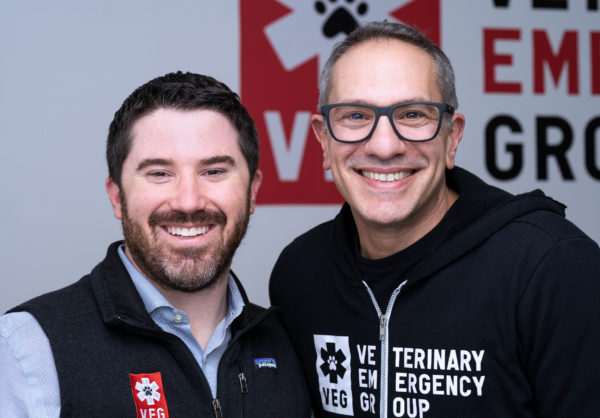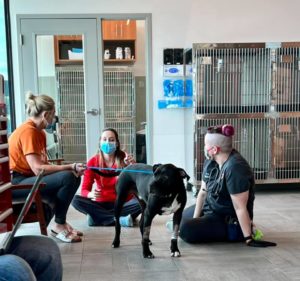
Veterinary emergency specialist Dr. David Bessler first struck out on his own in 2014 after running the emergency services department for a specialty veterinary company. He had been an emergency veterinarian since 2003, and decided to utilize his expert knowledge to purchase and operate an emergency veterinary hospital in White Plains.
“I always knew that emergency could be done a better way if it lived on its own as just an emergency business, not inside a specialty hospital,” said Bessler, CEO and founder of Veterinary Emergency Group (VEG). “My wife and I bought that first hospital in 2014 and we just started doing things differently, in a very open and transparent way.”
The hospital had been started by 20-plus local veterinarians decades ago, and Bessler decided to keep the name.
The obvious difference between VEG and most veterinary hospitals is the focus on pet emergencies. But Bessler also wanted to make the space more inviting and less worry-inducing for anxious owners and their pets.
“The norm is to separate people from their pets,” Bessler said. “You take people’s pets when they’re having an emergency, you bring them into the back where you do whatever tests or shots you need to do, and the owners have to stay up front. They’re not allowed to come with you.
 “We changed all that and started keeping people with their pets and not separating them,” he expanded. “We even took that to an extreme where we actually had multiple families who would come back in with their pets. And so everybody would be in one big open treatment area, all watching each other’s emergencies and sometimes even, uh, ‘participating’ in the care of other people’s pets. And that just really took off.”
“We changed all that and started keeping people with their pets and not separating them,” he expanded. “We even took that to an extreme where we actually had multiple families who would come back in with their pets. And so everybody would be in one big open treatment area, all watching each other’s emergencies and sometimes even, uh, ‘participating’ in the care of other people’s pets. And that just really took off.”
After seeing the success of the White Plains practice, Bessler and his wife opened up another one, this time across the river in Nanuet.
“We had two hospitals that were just doing emergency very differently, financially successful and doing well for the pet owners, pets and the referring veterinarians we had partnered with,” he said. “And then in 2016, I got an email from David Glattsstein.”
Glattstein had been working in the investment world for over a decade, with experience in growing businesses and health care investments. His email to Bessler was an invitation to contact him if he was interested in teaming up to expand the company.
“I had admired the veterinary space for a long time, said Glattstein, now president and co-founder of VEG. “It’s a fantastic industry, very long-term trends.”
After getting to know each other”™s hopes and aspirations for VEG, and Glattstein officially joining the team, the pair met with Sequoia Heritage, a financial group that invested millions of dollars into VEG”™s first two rounds of funding beginning in July of 2017, when it still had only two hospitals and fewer than 20 employees.
With that, they expanded into two new New Jersey locations and one on Manhattan”™s Upper East Side.
Now VEG reaches across nine states (New York, New Jersey, California, Colorado, Florida, Georgia, Illinois, Massachusetts and Texas) and Washington, D.C. with 27 veterinary emergency hospitals and about 1,800 veterinary professionals, including more than 200 Westchester-based employees between its hospital in White Plains and its headquarters in Valhalla.
“We see about 300,000 patients a year,” Glattstein said.
This past September, VEG gained an additional $100 million in its third round of funding from D1 Capital Partners, Fidelity Management & Research Company and Durable Capital Partners, which the company plans to use to invest in growth and staffing investments, including recruitment, credentialing and continued education, student debt repayment and equity opportunities for staff members.
Additionally, the company plans to invest in well-being initiatives and a healthy, balanced work environment, which is another key to its leadership in an industry with a reportedly high rate of burnout for its doctors and nurses.
VEG works hard to ensure its veterinarians and nurses feel valued for their unique contributions as the focus of the practice, and they aim to recruit new team members who are inspired by emergency veterinary work in particular.
“I think overall, the revolutionary bigger picture is that nobody has ever treated veterinarian emergency medicine as its own thing,” Bessler said. “It’s always been a part of a specialty hospital, where they were places that were general practices that just stayed open at night and said that they practiced emergency. Nobody’s ever treated it as its own thing, and so there are a lot of things that stem from that.”
Often in specialty practices, he continued, “the emergency service was just a helper service, and so you were just there helping us, and if you went and joined the general practice to be on at night for emergencies, you were just maybe the sucker that agreed to take the overnight shifts. Whereas here, there’s nobody more important to us than an emergency doctor or emergency veterinary nurse.”
Through all the expansions, VEG has retained its unique care model, made to make pets and their owners feel at ease in their most challenging situations by allowing them to stay together throughout the process. Pets can get care in whatever position they are most comfortable, with care providers sitting on the floor if the pet is most at ease there.
The process also allows pets to receive care more efficiently by recognizing a model that flows better with emergency care and procedures.
“The flow in the hospital has always been set by people that practice appointment-based medicine,” Bessler said. “So whether you’re in a specialty business with general practice cases where people make appointments, come in for their appointments, sign in at the front desk and then they go wait in a room until the nurse or the doctor comes in ”” that doesn’t make sense for emergency.
“But nobody ever realized that because they were never thinking of emergency as its own thing, appointments don’t exist on emergency,” he continued. “So we really don’t have waiting rooms that you walk in, we don’t have a way for you to get into an exam room from the lobby that you walk into, because nobody does that. You walk in, you go straight to the back, you get some care right away. That’s something that nobody would have thought to do, because nobody treated emergency as its own thing. So that’s another big way we’re revolutionizing things.”
With Covid, more and more pets are being adopted, meaning more pet emergencies, especially for first-time pet owners. Along with that, the influx of pets put a strain on regular veterinary offices, which can only take on so much patient volume, leaving less room for emergency appointments and driving more care that is not necessarily an emergency situation toward emergency centers like VEG.
Bessler reported an increase in caseloads from 50% to 150% in VEG”™s locations across the country since the start of the pandemic. In addition, the practices had to rethink a model that focused on the gathering of many pets, owners and care providers all at once.
One way they dealt with that was by beginning to treat pets behind a glass partition, through which owners could be just an inch away throughout the process.
“I think we set up as a true frontline business during Covid,” Glattstein said. “I think that veterinary professionals didn’t get the same attention that human health care professionals got, but I think that the Westchester community would be really proud of our hospital for staying open 24/7 every day, every minute, every hour during Covid when people and their pets needed us the most.”
Bessler and Glattstein are both proud Westchester residents (in White Plains and Scarsdale, respectively) and are proud to be launching such an industry-changing venture so close to home, after that first hospital on Tarrytown Road.
“Not only was it local for us, but we felt we are a differentiated brand in Westchester County,” Glattstein said. “We’re not a differentiated brand in New York City and being in Westchester allowed us to be close to home, be from where we started, and have a growth business in Westchester. I don’t think anyone in Westchester”™s growing as fast as us, both from an employee perspective and from a revenue perspective.”
Its proximity to Westchester”™s veterinary training programs at Westchester Community College and Mercy College allow for partnerships and clinical training opportunities with new veterinary professionals.
The company will also expand its Westchester footprint even further this year with a new training center at 44 South Broadway in downtown White Plains that will attract veterinarians from around the world to train. Construction will begin early next year for a 2022 summer opening.
After that, the founders say they hope for VEG to become a nationwide ”” and even worldwide ”” name.
“The world doesn’t have a veterinary emergency company. We are going to be that ”” the world’s veterinary emergency company. That’s our goal,” Bessler said. “I think the pet owners that come to us love us. And we are very grateful for our being here. Veterinary emergency professionals love working for us, and I think general practices love having us as emergency partners. So there’s no reason why all those people throughout the United States shouldn”™t have access to the same experience ”” and worldwide.”




















